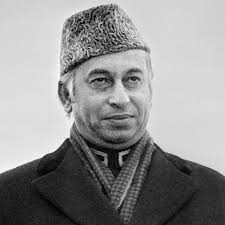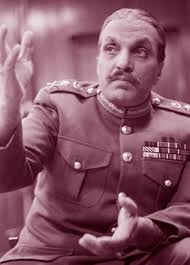
1/n
The major damage to the integrity of the country was done, in the initial stages, by Ghulam Muhammad, who began to rule over Pakistan as if it was his personal fiefdom. A civil servant, who had been propelled to the highest office..
The major damage to the integrity of the country was done, in the initial stages, by Ghulam Muhammad, who began to rule over Pakistan as if it was his personal fiefdom. A civil servant, who had been propelled to the highest office..
https://twitter.com/IkJustuju/status/1329715123410309122
2/n
..of the land through sheer luck made himself all-powerful because others around him were minions. How else can one explain the acceptance of a paralytic governor-general whose utterances could not be understood, whose tantrums caused humiliation to those around him..
..of the land through sheer luck made himself all-powerful because others around him were minions. How else can one explain the acceptance of a paralytic governor-general whose utterances could not be understood, whose tantrums caused humiliation to those around him..

3/n
..whose unconstitutional measures created the first crack in the edifice of Pakistan. His tampering with the constitution could only be given sanction by a timid judiciary.
By dismissing Khwaja Nazimuddin, on 17 April 1953, when he was still commanding the majority..
..whose unconstitutional measures created the first crack in the edifice of Pakistan. His tampering with the constitution could only be given sanction by a timid judiciary.
By dismissing Khwaja Nazimuddin, on 17 April 1953, when he was still commanding the majority..

4/n
.. in the constituent assembly and against whom no mass street movement or agitation had started Ghulam Muhammad set a wrong precedent.
This, unfortunately, became the political culture in Pakistan thereafter. But the Supreme court decision in 1955 overturning..
.. in the constituent assembly and against whom no mass street movement or agitation had started Ghulam Muhammad set a wrong precedent.
This, unfortunately, became the political culture in Pakistan thereafter. But the Supreme court decision in 1955 overturning..
5/n
the high court judgment in the Maulvi Tamizuddin vs State case did set a precedent for all future unconstitutional acts under the cover of the law of necessity. Tamizuddin was from East Pakistan. The unwarranted dismissals of Khwaja Nazimuddin and Maulvi Tamizuddin..
the high court judgment in the Maulvi Tamizuddin vs State case did set a precedent for all future unconstitutional acts under the cover of the law of necessity. Tamizuddin was from East Pakistan. The unwarranted dismissals of Khwaja Nazimuddin and Maulvi Tamizuddin..

6/n
..greatly angered the Bengalis.
Due to the peculiar nature of the terrain in East Bengal where massive rivers and numerous streams bisect and divide the countryside into several isolated areas the provincial administration had to be, per force, decentralized.
..greatly angered the Bengalis.
Due to the peculiar nature of the terrain in East Bengal where massive rivers and numerous streams bisect and divide the countryside into several isolated areas the provincial administration had to be, per force, decentralized.
7/n
There was a dire need of examining the question of distribution of powers between the central and East Pak in particular in the very early stages. Since East Pakistan was not contagious to West Pakistan and the communication channels were both tenuous and time-consuming..
There was a dire need of examining the question of distribution of powers between the central and East Pak in particular in the very early stages. Since East Pakistan was not contagious to West Pakistan and the communication channels were both tenuous and time-consuming..
8/n
it was necessary to have treated the eastern wing as a special case as regards granting of regional autonomy. Linking the decision with the other four provinces was not necessary.
it was necessary to have treated the eastern wing as a special case as regards granting of regional autonomy. Linking the decision with the other four provinces was not necessary.
9/n
The only person who had the ability and the stature to keep the two wings together was Hussein Shaheed Suharwardy who was also alienated when he was forced to resign from the prime ministership in October, 1957.
The only person who had the ability and the stature to keep the two wings together was Hussein Shaheed Suharwardy who was also alienated when he was forced to resign from the prime ministership in October, 1957.

10/n
When the Awami League assumed office, great jolts were in store for the Bengali nationalists. Nazrul Islam, a Bengali analyst, considers Suharwardy’s acceptance of the ministry as ‘disastrous’ for the separatist movement.
When the Awami League assumed office, great jolts were in store for the Bengali nationalists. Nazrul Islam, a Bengali analyst, considers Suharwardy’s acceptance of the ministry as ‘disastrous’ for the separatist movement.
11/n
This was the only period in the history of east-west relations which was free from bitterness between the two wings. With Suharwardy in power, it seemed that the dissident Bengali leaders had, at last, got a chance to participate in the governance of the country.
This was the only period in the history of east-west relations which was free from bitterness between the two wings. With Suharwardy in power, it seemed that the dissident Bengali leaders had, at last, got a chance to participate in the governance of the country.
12/n
The contentious issues were frozen, and the 1956 Constitution was, more or less, accepted by Bengali as the framework within which further redress of their grievances would be sought.
The contentious issues were frozen, and the 1956 Constitution was, more or less, accepted by Bengali as the framework within which further redress of their grievances would be sought.
13/n
The ambitions of the new President Iskander Mirza (Bengali) were not fully satisfied by the new Constitution. He was not content with being merely a constitutional head of state.
The ambitions of the new President Iskander Mirza (Bengali) were not fully satisfied by the new Constitution. He was not content with being merely a constitutional head of state.

14/n
He, therefore political maneuvering and wheeling-dealing, he appointed whom he liked and dismissed him when he pleased. Ministry making and ministry breaking in the center became a game of musical chairs. Minsters came and went at the whim of the President Mirza.
He, therefore political maneuvering and wheeling-dealing, he appointed whom he liked and dismissed him when he pleased. Ministry making and ministry breaking in the center became a game of musical chairs. Minsters came and went at the whim of the President Mirza.
15/n
The story was the same in the provinces though for somewhat different reasons. Corruption had become rampant in both wings & hopes of a change in the order by a democratic process were being rapidly dashed by the repeated postponements of the elections.
The story was the same in the provinces though for somewhat different reasons. Corruption had become rampant in both wings & hopes of a change in the order by a democratic process were being rapidly dashed by the repeated postponements of the elections.
16/n
All this was not without a purpose, for, in the meantime, Iskander Mirza in collaboration with the C-in-C of the Army was planning a secret operation called “operation over-lord” to abrogate the constitution dismiss the NA and the cabinet, and ban all political activities.
All this was not without a purpose, for, in the meantime, Iskander Mirza in collaboration with the C-in-C of the Army was planning a secret operation called “operation over-lord” to abrogate the constitution dismiss the NA and the cabinet, and ban all political activities.

17/n
The law and order situation had no doubt deteriorated. But yet the answer was not to use force, nor to deny freedom of expression, and certainly not to impose martial law, abrogate the constitution and deprive the people of their legitimate rights.
The law and order situation had no doubt deteriorated. But yet the answer was not to use force, nor to deny freedom of expression, and certainly not to impose martial law, abrogate the constitution and deprive the people of their legitimate rights.
• • •
Missing some Tweet in this thread? You can try to
force a refresh










